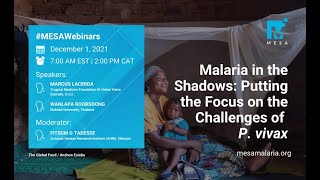Last Updated: 09/05/2024
Effectiveness of novel approaches to radical cure of vivax malaria – a randomized controlled trial (EFFORT)
Objectives
To compare the effectiveness, safety, cost-effectiveness and feasibility of novel radical cure options.
Specific objectives:
- To assess the effectiveness of a short-course of high dose primaquine (PQ) (total dose 7mg/kg given unsupervised over 7 days) compared to the current standard low dose primaquine regimen (total dose 3.5mg/kg given unsupervised over 14 days).
- To assess the effectiveness of tafenoquine (TQ) (single dose of 300mg) compared to the short-course high dose primaquine regimen.
- To assess the safety of tafenoquine compared to the high and low dose primaquine regimens.
- To assess the cost-effectiveness and feasibility of high dose primaquine and tafenoquine compared to the current low dose primaquine regimen.
University of Melbourne (UoM), Australia
National Center for Parasitology, Entomology and Malaria Control (CNM) Cambodia, Cambodia
Mahidol Oxford Tropical Medicine Research Unit (MORU), Thailand
Ethiopian Public Health Institute (EPHI), Ethiopia
University of Sumatera Utara, Indonesia
Aga Khan University, Pakistan
Arba Minch University (AMU), Ethiopia
There have been three major advances in the tools available to tackle P. vivax relapses recently: single dose tafenoquine, short course high dose primaquine, and a novel quantitative point of care G6DP test.
Whilst single dose radical cure with tafenoquine represents a major advance, there are concerns that the pivotal Phase 3 clinical trials were designed for non-inferiority to the low dose PQ regimen. There is increasing evidence that in many locations low dose primaquine is inferior to a high dose primaquine regimen. Now that G6PD diagnosis can be assured and short-course high-dose primaquine can be administered safely, there is an urgent need to compare the safety and effectiveness of these alternative treatment strategies.
The study will contribute to: the adjustment and revision of treatment recommendations and the evidence-based role out of radical cure.
ClinicalTrials.gov Identifier: NCT04411836
- Allocation: Randomized
- Intervention Model: Parallel Assignment
- Masking: None (Open Label)
- Primary Purpose: Treatment
Apr 2021 — Sep 2024

